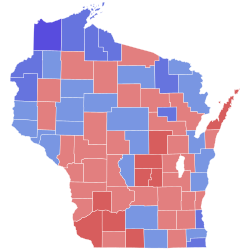| |||||||||||||||||
| |||||||||||||||||
 County results Proxmire: 50–60% 60–70% 70–80% Renk: 50–60% 60–70% | |||||||||||||||||
| |||||||||||||||||
| Elections in Wisconsin |
|---|
 |
The 1964 United States Senate election in Wisconsin was held on November 3, 1964. Incumbent Democrat William Proxmire was re-elected to a second full term in office over Republican Wilbur Renk.

